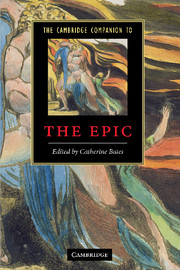Book contents
- Frontmatter
- 1 The Epic of Gilgamesh
- 2 Greek epic
- 3 Roman epic
- 4 Heroic epic poetry in the Middle Ages
- 5 Dante and the epic of transcendence
- 6 Italian Renaissance epic
- 7 Camões’s Os Lusíadas: the first modern epic
- 8 The Faerie Queene: Britain’s national monument
- 9 The seventeenth-century Protestant English epic
- 10 Mock-heroic and English poetry
- 11 Romantic re-appropriations of the epic
- 12 Ezra Pound, T.S. Eliot, and the modern epic
- 13 Derek Walcott’s Omeros
- 14 Epic in translation
- Guide to further reading
- Index
10 - Mock-heroic and English poetry
Published online by Cambridge University Press: 28 May 2010
- Frontmatter
- 1 The Epic of Gilgamesh
- 2 Greek epic
- 3 Roman epic
- 4 Heroic epic poetry in the Middle Ages
- 5 Dante and the epic of transcendence
- 6 Italian Renaissance epic
- 7 Camões’s Os Lusíadas: the first modern epic
- 8 The Faerie Queene: Britain’s national monument
- 9 The seventeenth-century Protestant English epic
- 10 Mock-heroic and English poetry
- 11 Romantic re-appropriations of the epic
- 12 Ezra Pound, T.S. Eliot, and the modern epic
- 13 Derek Walcott’s Omeros
- 14 Epic in translation
- Guide to further reading
- Index
Summary
Sometime during the Restoration, the status of epic as the highest poetic genre went into a decline from which it has never recovered. As T. S. Eliot said, 'since Milton, we have had no great epic poem'. Great poems with epic aspirations or pretensions have continued to be written: Wordsworth's Prelude, Byron's Don Juan, Keats's Hyperion poems, Eliot's Waste Land, Pound's Cantos, and of course (though in prose) Joyce's Ulysses. The great example in our time is Walcott's Omeros. None of these, however, belongs straightforwardly to the genre of the Iliad, the Aeneid, or Paradise Lost, in the sense of being a long poem, in elevated language, on a high theme of tribal glory, or national origins, or scriptural myth, containing narratives of battle, and usually a high valuation of martial prowess. Many of them remained unfinished, or (like the Waste Land and perhaps the Cantos) mimic the unfinished state in being organized in 'fragments'. All these works bear some relation to the epic tradition, allusive and often ironic, but each proceeds from a sense that the primary or traditional form is no longer available to good poets. Some (Don Juan, the Waste Land, Ulysses) sustain a pointed ironic relationship, and use epic reminders and mock-heroic procedures to exploit continuities and disjunctions between past and present, or the collision of grandiloquent perspectives with a lowered reality. In this regard, they were descendants of what one might call the first mock-heroic moment, when, perhaps for the only time in history, some of the best poets devoted some of their strongest energies to a hybrid genre that parodied the epic but did not satirize it.
- Type
- Chapter
- Information
- The Cambridge Companion to the Epic , pp. 167 - 192Publisher: Cambridge University PressPrint publication year: 2010
- 9
- Cited by

